Recently published books
Here is a selection of recent book publications either by or contributed to by our academics and research colleagues.
The Politics of Feeling
.jpg) The Politics of Feeling argues that politics has become a matter of political feelings in an age of uncertainty. The uncertainties of the post-2008 period have transformed the political arena and made the question of how people feel central to the formation of political affiliations and divisions. The book identifies three competing political forms in the US and the UK today: right-wing populism, progressivism, and contemporary liberalism. It argues that rather than namingcoherent programs of political thought, these popular political forms are operating as arrangements or modes of attachment and political intensity. Each one suggests a different way of remembering the past, imagining the future, and making the present politically meaningful.
The Politics of Feeling argues that politics has become a matter of political feelings in an age of uncertainty. The uncertainties of the post-2008 period have transformed the political arena and made the question of how people feel central to the formation of political affiliations and divisions. The book identifies three competing political forms in the US and the UK today: right-wing populism, progressivism, and contemporary liberalism. It argues that rather than namingcoherent programs of political thought, these popular political forms are operating as arrangements or modes of attachment and political intensity. Each one suggests a different way of remembering the past, imagining the future, and making the present politically meaningful.
Sustainable Food Consumption in China
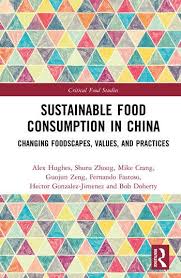 This book investigates the current and potential roles of food consumption to address sustainability challenges in China. Focusing on the megacity of Guangzhou, it looks at sustainability and food from the perspectives of government, commercial, and third sector actors, and through the lived experiences of consumers. It charts the rapidly transforming landscapes of retail across urban China and the ways they are shaping and are shaped by everyday food consumption practices. Using a multi-method approach, it provides readers with a rich and comprehensive understanding of the relationships and tensions between contemporary practices of food consumption and pressing sustainability challenges. It unpacks the complex foodscape in contemporary Chinese cities, from traditional wet markets to online deliveries, from supermarkets to farmers markets and alternative food providers, to understand the values and practices promoting and hindering sustainability in food consumption.
This book investigates the current and potential roles of food consumption to address sustainability challenges in China. Focusing on the megacity of Guangzhou, it looks at sustainability and food from the perspectives of government, commercial, and third sector actors, and through the lived experiences of consumers. It charts the rapidly transforming landscapes of retail across urban China and the ways they are shaping and are shaped by everyday food consumption practices. Using a multi-method approach, it provides readers with a rich and comprehensive understanding of the relationships and tensions between contemporary practices of food consumption and pressing sustainability challenges. It unpacks the complex foodscape in contemporary Chinese cities, from traditional wet markets to online deliveries, from supermarkets to farmers markets and alternative food providers, to understand the values and practices promoting and hindering sustainability in food consumption.
An Atmospheric History of Smoking in Modern Britain
This book studies the historiography of smoking in modern Britain, with a focus on the social, cultural, and emotional aspects of the practice.
Centring on four specific moments in modern British history; the turn of the 20th century, the Second World War, the 1980s, and the mid-2000s, An Atmospheric History of Smoking not only traces the history of tobacco use, but explores the cultural significance of - and attitudes toward – smoking. Markovic combines oral histories with archival research and artefact analysis, in order to evoke the unique social atmospheres surrounding smoking at each of these key periods within British history.
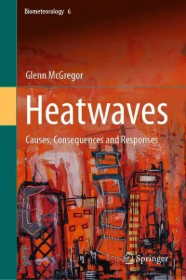 Heatwaves: Causes, Consequences and Responses
Heatwaves: Causes, Consequences and Responses
Distinctively, this book brings together an end-to-end understanding of heatwaves, that is, a consideration of their causes, consequences for human and natural systems and societal responses to them in the form of adaptation and mitigation actions. It advocates for recognizing "the heatwave imperative" and emphasizes that “heatwaves matter”. Together, the individual chapters make the point that “knowing heatwaves” from a holistic interdisciplinary perspective will assist with efforts towards heatwave risk reduction and building resilience to what is probably the most pervasive of a range of climate hazards.
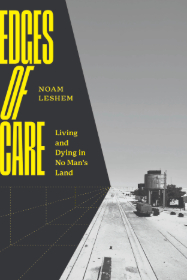 Edges of Care: Living and Dying in No Man's Land
Edges of Care: Living and Dying in No Man's Land
A firsthand look at the lives of those who reside in no man’s land—the violence they endure and their immense resilience. “No man’s land” invokes stretches of barren landscape, twisted barbed wire, desolation, and the devastation of war. But this is not always the reality. According to Noam Leshem in Edges of Care, the term also reveals radical abandonment by the state. From the Northern Sahara to the Amazon rainforests, people around the world find themselves in places that have been stripped of sovereign care. Leshem is committed to defining these spaces and providing a more intimate understanding of this urgent political reality.
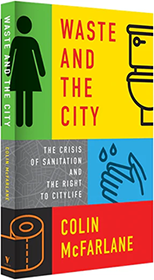 Waste and the City: The Crisis of Sanitation and the Right to Citylife
Waste and the City: The Crisis of Sanitation and the Right to Citylife
Sanitation is fundamental to urban public life and health. We need Sanitation for All.
In an age of pandemics the relationship between the health of the city and good sanitation has never been more important. Waste and the City is a call to action on one of modern urban life's most neglected issues: sanitation infrastructure. The Covid-19 pandemic has laid bare the devastating consequences of unequal access to sanitation in cities across the globe. At this critical moment in global public health, Colin McFarlane makes the urgent case for Sanitation for All.
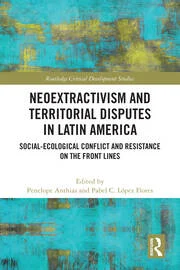 Neoextractivism and Territorial Disputes in Latin America: Social-ecological Conflict and Resistance on the Front Lines
Neoextractivism and Territorial Disputes in Latin America: Social-ecological Conflict and Resistance on the Front Lines
Latin American development models continue to prioritise extractivism: the intensive exploitation and exportation of nature in its primary commodity form. This constant expansion of the extractive frontier into new territories leads to forms of place-based resistance, negotiation and struggle in which competing territorial projects and claims are at stake. This book uncovers the underlying trends and dynamics of these ‘territorialities in dispute’, and the socio- ecological resistance movements that are emerging as marginalized communities struggle to reclaim their territorial rights and defend and protect their right of access to the global commons. A focus on territorialities in dispute renders visible the unsustainable expansion of extractivist territories and opens up new horizons to learn from these processes and to consider post-extractivist/post-development imaginings of another world and alternate futures – as well as the challenges to their realisation.
If the predictions are correct, climate change will force millions of people from their homes, threatening a future of humanitarian crises, political violence, and strife. In The Other of Climate Change, Andrew Baldwin intervenes in the international political debate about climate change and human migration to tell a different story. He argues that international attempts to govern those who stand to be displaced by climate change are as much or more to do with resuscitating European humanism at a moment in which geophysical phenomena like climate change and the Anthropocene threaten to extinguish the human altogether. Through detailed interpretations of the figure of the climate migrant/refugee, Baldwin traces the contours of an emerging form of planetary racial rule – racial futurism - unfolding in the context of the climate change crisis.
.webp) The Routledge Handbook of Ocean Space
The Routledge Handbook of Ocean Space
Invisible as the seas and oceans may be for so many of us, life as we know it is almost always connected to, and constituted by, activities and occurrences that take place in, on and under our oceans. The Routledge Handbook of Ocean Space provides a first port of call for scholars engaging in the ‘oceanic turn’ in the social sciences, offering a comprehensive summary of existing trends in making sense of our water worlds, alongside new, agenda-setting insights into the relationships between society and the ‘seas around us’. Accordingly, this ambitious text not only attends to a growing interest in our oceans, past and present; it is also situated in a broader spatial turn across the social sciences that seeks to account for how space and place are imbricated in socio-cultural and political life.
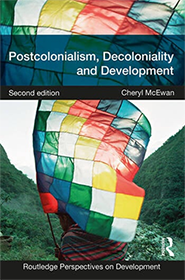 Postcolonialism, Decoloniality and Development
Postcolonialism, Decoloniality and Development
Postcolonialism, Decoloniality and Development is a comprehensive revision of Postcolonialism and Development (2009) that explains, reviews and critically evaluates recent debates about postcolonial and decolonial approaches and their implications for development studies. By outlining contemporary theoretical debates and examining their implications for how the developing world is thought about, written about and engaged with in policy terms, this book unpacks the difficult, complex and important aspects of the relationships between postcolonial theory, decoloniality and development studies.
.jpg) Robin
Robin
The robin is a small bird with a distinctive ruddy breast, at once a national treasure and a bird with a global reputation. In this superbly illustrated account, Helen F. Wilson looks at many aspects of the cherished robin, from its status as a harbinger of seasonal change and icon of Christmas, to its place in fairy tales, environmental campaigns and scientific discovery. In moving between cultural and natural histories, Robin asks wide-ranging questions: how did the robin’s name travel the world? Why is the robin so melancholy? Who was Cock Robin? And how has the history of the colour red shaped the robin’s ambivalent associations and unusual origin stories?
.jpg) Systems of Suffering: Dispersal and the Denial of Asylum
Systems of Suffering: Dispersal and the Denial of Asylum
Of the many state-enacted cruelties to which refugees and asylum seekers are subjected, detention and deportation loom largest in popular consciousness. But there is a third practice, perpetrating a slower violence, that remains hidden: dispersal. Jonathan Darling provides the first detailed account of how dispersal - the system of accommodation and support for asylum seekers and refugees in Britain - both sustains and produces patterns of violence, suffering and social abjection. He explores the evolution of dispersal as a privatised process, from the first outsourced asylum accommodation contracts in 2012 to the renewed wave of outsourcing pursued by the Home Office today. Systems of Suffering is a vital tool in the arsenal of those fighting to hold the government to account for the violence of its asylum policy and practice.
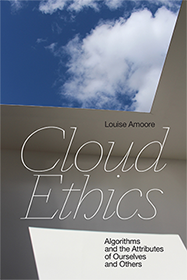 Cloud Ethics: Algorithms and the Attributes of Ourselves and Others
Cloud Ethics: Algorithms and the Attributes of Ourselves and Others
In Cloud Ethics Louise Amoore examines how machine learning algorithms are transforming the ethics and politics of contemporary society. Conceptualizing algorithms as ethicopolitical entities that are entangled with the data attributes of people, Amoore outlines how algorithms give incomplete accounts of themselves, learn through relationships with human practices, and exist in the world in ways that exceed their source code.
In these ways, algorithms and their relations to people cannot be understood by simply examining their code, nor can ethics be encoded into algorithms. Instead, Amoore locates the ethical responsibility of algorithms in the conditions of partiality and opacity that haunt both human and algorithmic decisions. To this end, she proposes what she calls cloud ethics—an approach to holding algorithms accountable by engaging with the social and technical conditions under which they emerge and operate.
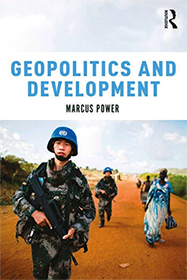 Geopolitics and Development
Geopolitics and Development
Geopolitics and Development examines the historical emergence of development as a form of governmentality, from the end of empire to the Cold War and the War on Terror. It illustrates the various ways in which the meanings and relations of development as a discourse, an apparatus and an aspiration, have been geopolitically imagined and enframed.
The book traces some of the multiple historical associations between development and diplomacy and seeks to underline the centrality of questions of territory, security, statehood and sovereignty to the pursuit of development, along with its enrolment in various (b)ordering practices.
Virtual Library: Other forms of publication
You should also visit these other sections of the Geography Research and Impact Virtual Library:
Audi-Visual Media
Creative media
Research and Impact
We are a large department of human and physical geographers conducting world-leading research that addresses pressing socio-economic, political and environmental challenges.
Virtual Library
Much of our research takes final form in high-impact articles or books. But a considerable amount of our activity takes place in other mediums.
Sustainable Development Goals
Much of the research that we do and the impacts that we make are relevant to the pursuit of the United Nations Sustainable Development Goals (SDGs).
Contact Us
Founded in 1928, the Department of Geography at Durham University is one of the leading centres of geographical research and education in the world.
Department of Geography
Postgraduate Study
Durham University
Lower Mountjoy
South Road, Durham
DH1 3LE, UK
Tel: +44 (0)191 33418000


/prod01/prodbucket01/media/durham-university/departments-/geography/Matt_Couchmann-3872X1296.JPG)

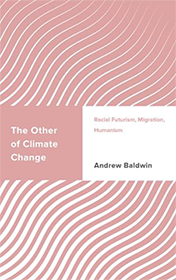
/prod01/prodbucket01/media/durham-university/departments-/geography/impact/digital_media.jpg)
/prod01/prodbucket01/media/durham-university/departments-/geography/photo-competition/2024-photo-competiton/2024-slideshow/Screenshot_16-5-2025_133645_.jpeg)
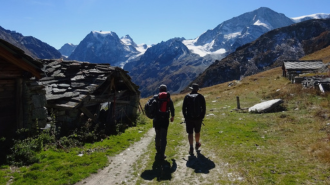
.png)



